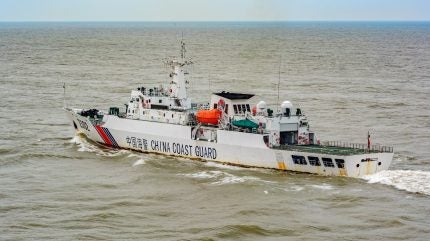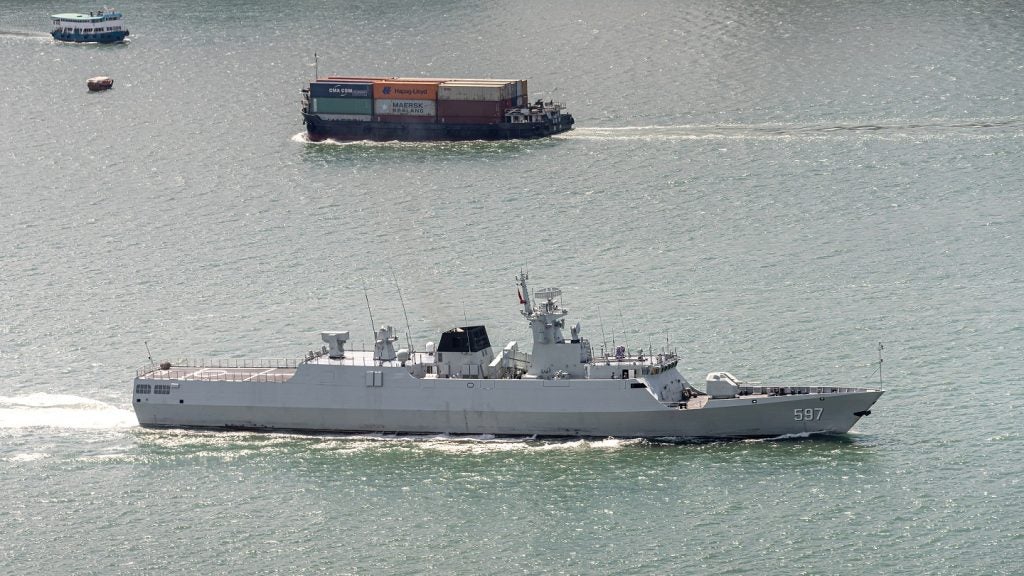
The China Coast Guard (CCG), notorious for its grey zone operations against countries whose waters are claimed as part of Beijing’s ‘nine-dash line’ ambitions, entered the Arctic Ocean for the first time in late-September 2024, to begin joint patrols with Russia.
Announcing the CCG’s entry into the Arctic Ocean, China’s Ministry of National Defense (MND) stated in early October that the move was intended to “test the vessels’ ability to carry out missions in unfamiliar maritime areas”, and bolster “participation in international and regional maritime governance”.

Discover B2B Marketing That Performs
Combine business intelligence and editorial excellence to reach engaged professionals across 36 leading media platforms.
Joint patrols of the CCG and Russian Coast Guard began on 21 September, the MND said, with the coast guards “conducted law enforcement inspections on fishing vessels operating in the region”, intended to “maintain order in high seas fisheries”.
With Beijing seeking to extend China’s influence around the world, the CCG has been chosen as the prime force to leverage, and potentially force, influence in waters far from its exclusive economic zones.
The CCG has been the lead force in China’s maritime grey zone operations in the South and East China Seas, conducting operations against fisheries and naval vessels of countries with competing claims in the region that fall short of prompting a military response.
This includes ramming rivals coast guard and naval vessels, as well as conducting violent hand-to-hand boarding actions with clubs and axes.

US Tariffs are shifting - will you react or anticipate?
Don’t let policy changes catch you off guard. Stay proactive with real-time data and expert analysis.
By GlobalDataIn a 2022 research paper by the US-based think tank RAND, it was argued that China viewed grey zone activities as “a natural extension of how countries exercise power” and were used as a way to “pressure countries to act according to Beijing’s interests”.
Continuing, RAND stated that from 2012-2022, China had employed “nearly 80 grey zone tactics across all instruments of power against Taiwan, Japan, Vietnam, India, and the Philippines”.
China seeking to become Arctic power
China has declared itself a ‘near-Arctic state’ and in the mid-2010s stated its desire to be a polar global power by 2030. This is despite the country’s nearest point being some 1,500km south of the Arctic Circle.
Amid a shifting global order brought about a fracturing of the Western powers and a weakening US, Beijing sees opportunity in aligning with Russia in the Arctic in a bid to secure access, potentially even sovereignty of, the region’s natural resources.
A 2023 research paper by the US-based Center for Strategic and International Studies (CSIS) pointed to two scientific bases that China maintains on Iceland and the Norwegian archipelago of Svalbard, locations that could be used to justify Beijing’s presence in the region.

The CSIS paper pointed to a publication by the US Department of Defense (DoD) in 2019 that explicitly stated the risk that “civilian research could support a strengthened Chinese military presence in the Arctic Ocean”.
To this end, the use by China of the CCG in providing a military/paramilitary hybrid presence in the Arctic in support of Russia, as well as its own civilian assets already in place, provide Beijing with enough of a cassus belli to utilise more aggressive tactics in future when its interests are threatened.
Although not as developed as China’s People’s Liberation Army Navy (PLAN), the CCG is nevertheless a capable maritime force able to call upon more than 100 oceangoing patrol vessels.
In the early 2020s, the US DoD reported that the PLAN had donated 22 Type 056 corvettes to the CCG, a significant increase in naval capability.
Displacing around 1,500 tonnes and measuring 90m in length, the Type 056 corvettes are able to equip a range of relatively advanced anti-air, anti-surface, and anti-subsurface warfare systems. A total of 70 Type 056 frigates were built by four Chinese shipyards from 2011 to 2019.





